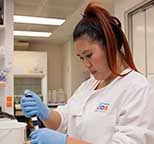Search
Showing results for "Professor"
Research
Young children's use of blue spaces and the impact on their health, development and environmental awareness: A qualitative study from parents' perspectivesThis study examined how families with young children access and use different types of blue spaces and the health and development benefits, and potential negative effects.
Research
Indigenous peoples and inclusion in clinical and genomic research: Understanding the history and navigating contemporary engagementDespite significant improvements in pediatric cancer survival outcomes, there remain glaring disparities in under-represented racial and ethnic groups that warrant mitigation by the scientific and clinical community. To address and work towards eliminating such disparities, the Pacific Pediatric Neuro-Oncology Consortium (PNOC) and Children's Brain Tumor Network (CBTN) established a Diversity, Equity, and Inclusion (DEI) working group in 2020. The DEI working group is dedicated to improving access to care for all pediatric patients with central nervous system (CNS) tumors, broadening diversity within the research community, and providing sustainable data-driven solutions.

News & Events
Time to improve gender inequality in scienceAbout half of all science graduates are women but despite large numbers entering the industry, women are still struggling to secure the top jobs.
News & Events
Funding boost to help researchers better understand how language developsTelethon Kids Institute researchers have been awarded an Australian Research Council grant to explore how testosterone levels in the womb can impact on a child'

News & Events
Researchers share their expertise with the community in CockburnResearchers from the Wesfarmers Centre of Vaccines and Infectious Diseases at The Kids Research Institute Australia have shared their expertise with the community in Cockburn, covering topics ranging from respiratory disease in babies to recurring ear infections in kids.
Research
Reproducible Bioinformatics Analysis Workflows for Detecting IGH Gene Fusions in B-Cell Acute Lymphoblastic Leukaemia PatientsB-cell acute lymphoblastic leukaemia (B-ALL) is characterised by diverse genomic alterations, the most frequent being gene fusions detected via transcriptomic analysis (mRNA-seq). Due to its hypervariable nature, gene fusions involving the Immunoglobulin Heavy Chain (IGH) locus can be difficult to detect with standard gene fusion calling algorithms and significant computational resources and analysis times are required. We aimed to optimize a gene fusion calling workflow to achieve best-case sensitivity for IGH gene fusion detection.
Research
Pre-Clinical Evaluation of the Hypomethylating Agent Decitabine for the Treatment of T-Cell Lymphoblastic LymphomaT-cell lymphoblastic lymphoma (T-LBL) is a rare and aggressive lymphatic cancer, often diagnosed at a young age. Patients are treated with intensive chemotherapy, potentially followed by a hematopoietic stem cell transplantation. Although prognosis of T-LBL has improved with intensified treatment protocols, they are associated with side effects and 10-20% of patients still die from relapsed or refractory disease. Given this, the search toward less toxic anti-lymphoma therapies is ongoing.
Research
Epstein–Barr virus infection, B-cell dysfunction and other risk factors converge in gut-associated lymphoid tissue to drive the immunopathogenesis of multiple sclerosis: a hypothesisMultiple sclerosis is associated with Epstein–Barr virus (EBV) infection, B-cell dysfunction, gut dysbiosis, and environmental and genetic risk factors, including female sex.
Research
Acute Leukaemia of Ambiguous Lineage Presenting as a Focal Bone Lesion: a Case ReportAcute leukaemia is the most common childhood malignancy. Almost all cases are classified as acute lymphoblastic leukaemia or acute myeloid leukaemia. Acute leukaemia of ambiguous lineage (ALAL) is a rare form of acute leukaemia that cannot be classified by a single lineage. Like other acute leukaemias, ALAL typically presents with nonspecific symptoms such as fatigue, fever, or bleeding.
Research
Defining the fetal origin of MLL-AF4 infant leukemia highlights specific fatty acid requirementsInfant MLL-AF4-driven acute lymphoblastic leukemia (ALL) is a devastating disease with dismal prognosis. A lack of understanding of the unique biology of this disease, particularly its prenatal origin, has hindered improvement of survival. We perform multiple RNA sequencing experiments on fetal, neonatal, and adult hematopoietic stem and progenitor cells from human and mouse.
